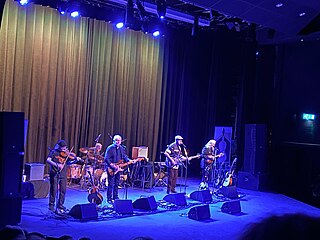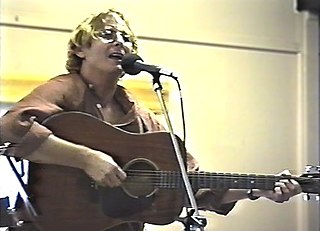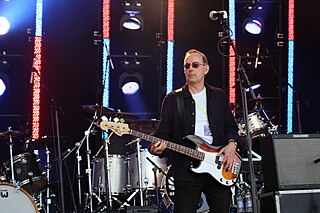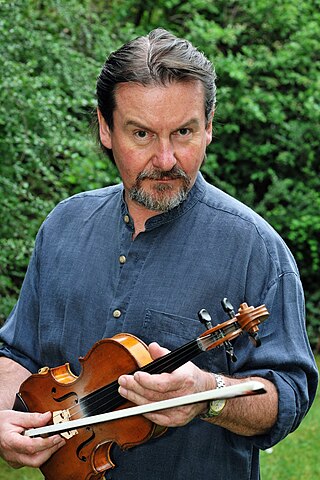
Fairport Convention are an English folk rock band, formed in 1967 by guitarists Richard Thompson and Simon Nicol, bassist Ashley Hutchings and drummer Shaun Frater. They started out influenced by American folk rock, with a set list dominated by Bob Dylan and Joni Mitchell songs and a sound that earned them the nickname "the British Jefferson Airplane". Vocalists Judy Dyble and Iain Matthews joined them before the recording of their self-titled debut in 1968; afterwards, Dyble was replaced by Sandy Denny, with Matthews later leaving during the recording of their third album.

Lindisfarne are an English folk rock band from Newcastle upon Tyne established in 1968. The original line-up comprised Alan Hull, Ray Jackson, Simon Cowe, Rod Clements and Ray Laidlaw (drums).
The Boys of the Lough is a Scottish-Irish Celtic music band active since the 1970s.
Here Northumbria is defined as Northumberland, the northernmost county of England, and County Durham. According to 'World Music: The Rough Guide', "nowhere is the English living tradition more in evidence than the border lands of Northumbria, the one part of England to rival the counties of the west of Ireland for a rich unbroken tradition. The region is particularly noted for its tradition of border ballads, the Northumbrian smallpipes and also a strong fiddle tradition in the region that was already well established in the 1690s. Northumbrian music is characterised by considerable influence from other regions, particularly southern Scotland and other parts of the north of England, as well as Irish immigrants.

James Alan Hull was an English singer-songwriter and founding member of the Tyneside folk rock band Lindisfarne.

Colosseum are an English jazz rock band, mixing blues, rock and jazz-based improvisation. Colin Larkin wrote that "the commercial acceptance of jazz rock in the UK" was mainly due to the band. Between 1975 and 1978 a separate band Colosseum II existed playing progressive rock.
Jack the Lad were a British folk rock group from North East England formed in 1973 by three former members of the most successful band of the period from the region, Lindisfarne. They moved from the progressive folk rock of Lindisfarne into much more traditional territory and were in the mid-1970s something of a northern counterpart to bands like Fairport Convention. They have also been seen as part of an important roots movement, rediscovering traditional Northumbrian music.

Alistair Hulett was a Scottish acoustic folk singer best known as the singer of the folk punk band, Roaring Jack.

Roderick Parry Clements is a British guitarist, singer-songwriter and multi-instrumentalist. He formed the folk-rock band Lindisfarne with Alan Hull in 1970, and wrote "Meet Me on the Corner", a UK Top 5 hit in March 1972, which won Clements an Ivor Novello Award. Lindisfarne broke up in 1973 and Clements became a founding member of Jack the Lad, also working with Ralph McTell and Bert Jansch. Lindisfarne reformed in 1977 and Clements continued to be part of the line-up until 2003. Rod rejoined Lindisfarne in 2015 and is currently touring and performing with the band.
Holly Lerski is an English singer and songwriter known both for her work with Angelou and for her solo career.

Hedgehog Pie were a British folk rock group from the north-east of England, that evolved between 1969 and 1971. Despite frequent line-up changes, they built up a considerable regional and national following and produced three highly regarded albums. They were connected to many of the most important folk and rock bands of the region from the 1970s and have been seen as one of the most significant groups in a rediscovery and popularisation of Northumbrian roots music.

Gary Fletcher is a British blues musician, best known for playing bass guitar with The Blues Band. He is also a guitarist and songwriter.
Geoff Heslop is an English record producer and musician.

Larry Mathews is a musician from Glenbeigh in the Irish County Kerry. He sings and plays Irish Folk, his own compositions as well as Rock and Pop. He plays Irish Fiddle, Guitar und Bodhrán. On stage he has played with Christy Moore, the Furey Brothers, The Dubliners, Achim Reichel and many others. He has recorded with Martin Röttger, as guest musician for Chris Evans & David Hanselmann, Hannes Wader and with many others.
The High Level Ranters are a Northumbrian traditional musical group founded in 1964, best known for being one of the first bands in the revival of the Northumbrian smallpipes.

Edward Hoh was an American rock drummer who was active in the 1960s. Although primarily a studio session and touring drummer, Hoh exhibited a degree of originality and showmanship that set him apart and several of his contributions have been singled out for acknowledgment by music critics.

Dave Burland is an English folk singer and guitarist. A former policeman, he has been performing in English folk clubs since 1968 and has been described by The Guardian as having a "uniquely relaxed singing style".

Bob Fox is an English folk guitarist and singer, specialising in traditional and contemporary songs of the north-east of England and in particular, the coal mining communities thereof. He is noted for his collaborations with Tom McConville and Stu Luckley, and for solo performances since 1982.
Simon Cowe was an English guitarist and multi-instrumentalist most noted as a member of the folk-rock group Lindisfarne from their original formation in 1970 until 1973, and then again from 1978 to his departure in 1993.











